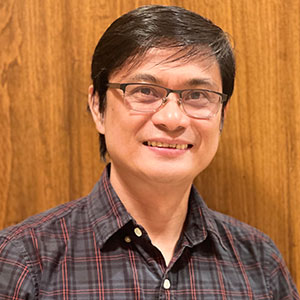Dr. Edgar Corpuz
About Dr. Corpuz
 Dr. Edgar Corpuz is an Associate Professor at the Department of Physics and Astronomy. He teaches a wide variety of courses including lower and upper-division physics courses, and graduate courses for the MSIS in Science and Technology program. He has been implementing student-centered teaching techniques in his courses which include lecture-demonstration and Team-Based Learning (TBL) approach. His research interests include students’ modeling of microscopic phenomena, microgenetic analysis of the dynamics of students’ knowledge construction of physics concepts, facilitating conceptual change in physics, improving students’ physics problem solving skills and performance, use of technology in the classroom especially the integration of web-based interaction system to enhance students’ motivation and conceptual understanding, and investigating the impact of inquiry-based learning materials in students’ ability to apply concepts in new situations. Dr. Corpuz currently serves as the graduate program coordinator of the MSIS in Science and Technology degree program. He had served as a principal investigator of a Robert Noyce grant which have significant components in the recruitment, retention, and mentoring of pre-service high school physics and chemistry students. In addition, he also served as a PI for another NSF grant under the NSF S-STEM program which involves the recruitment, retention, training, and development of predominantly Hispanic STEM majors in the physical sciences (chemistry and physics).
Dr. Edgar Corpuz is an Associate Professor at the Department of Physics and Astronomy. He teaches a wide variety of courses including lower and upper-division physics courses, and graduate courses for the MSIS in Science and Technology program. He has been implementing student-centered teaching techniques in his courses which include lecture-demonstration and Team-Based Learning (TBL) approach. His research interests include students’ modeling of microscopic phenomena, microgenetic analysis of the dynamics of students’ knowledge construction of physics concepts, facilitating conceptual change in physics, improving students’ physics problem solving skills and performance, use of technology in the classroom especially the integration of web-based interaction system to enhance students’ motivation and conceptual understanding, and investigating the impact of inquiry-based learning materials in students’ ability to apply concepts in new situations. Dr. Corpuz currently serves as the graduate program coordinator of the MSIS in Science and Technology degree program. He had served as a principal investigator of a Robert Noyce grant which have significant components in the recruitment, retention, and mentoring of pre-service high school physics and chemistry students. In addition, he also served as a PI for another NSF grant under the NSF S-STEM program which involves the recruitment, retention, training, and development of predominantly Hispanic STEM majors in the physical sciences (chemistry and physics).
Project
He redesigned PHYS 2425 (Physics for Scientists and Engineers Part I) to have the course materials completely free to students. He adopted a textbook from OpenStax, created lecture presentations based on the OER textbook, carefully chose homework sets that align with the weekly course objectives, recorded microlectures, and developed formative and summative assessments based on the new lecture materials.
Course Redesign Experience
He found redesigning his course very challenging which entailed a lot of work on his part. There is still more he would like to do to further improve his OER course to make it more responsive to the needs of his students and to improve the attainment of the course learning outcomes. He believes these challenges and work are worth it considering the benefit to UTRGV students. He is confident that the OER materials he adopted and created are very helpful resources in promoting meaningful learning among his students and are also very accessible to them which he believes has increased the student interaction with the course materials. He likes the idea of being able to customize the OER materials/resources to better suit the learning needs of his student as well as his teaching needs.
Student Feedback
His students were happy and appreciative of his efforts in making the curriculum materials completely free for the students especially during this time of pandemic where most of them are struggling financially.
Here are some direct quotes from his students.
“A major advantage to this course was that the curriculum was free for all students. Given the turbulent times we are currently in and the many students and families struggling financially, this was definitely a thoughtful and beneficial aspect of the course that our professor provided us with.” [Student 1]
“I would say that Dr. Corpuz Open Education Resources physics course was a great for the benefits it offered while at the same time giving a great learning experience to the students. The course was well structured with precise locations for important topics in our free open-source book which, made the course a more enjoyable experience with not having to worry about the price of learning resources and allowing those funds to be allocated elsewhere.” [Student 2]
Reflections
One of the things Dr. Corpuz likes about adopting OER resources is that it allows faculty to customize it to better suit the learning needs of their students. It also allows one more freedom to make improvements/enhancements in the future without worrying too much about copyright issues. If carefully designed, an OER course will have a great potential of making an impact on the learning of students while at the same time making course materials more affordable and accessible to students. He would consider the transitioning of his PHYS 2425 (Physics for Scientists and Engineers) to be one of the most rewarding teaching accomplishments he has had so far. He plans to slowly transition all the physics courses that he teaches to adopt OER resources with the aim to make his course curriculum materials completely free and accessible to his students.
He is appreciative that UTRGV’s University Library is currently encouraging faculty members to adopt OER resources and is thankful for the opportunity to participate in OER course development through the Affordable Textbook Adoption Grant.
Dr. Corpuz Contact Information
- Office: ESCNE 3.130
- Phone: 956.665.2153
- Email: edgar.corpuz@utrgv.edu